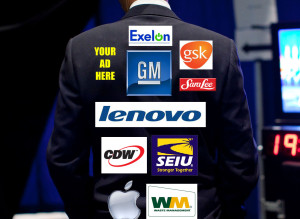A transparency group in California on Tuesday announced it had collected 40,000 signatures to place an initiative on the ballot that would require state representatives to wear the names of their top sponsors while on the floor of the Statehouse.
The initiative, called "California Is Not For Sale," was created in part to curb the influence of money in politics, and has been compared to NASCAR drivers displaying company logos on their shirts. It is backed by California attorney and businessman John Cox, who committed $1 million to the effort. It will need 365,000 valid signatures in order to qualify for the ballot in November, and organizers are confident they can muster enough support.
"The idea was conceived during a protest that was being staged for a separate ballot initiative in which we had all of the cutouts of California politicians covered in logos," Ryan Smith, a coordinator for the initiative, told The Huffington Post on Tuesday. "Everyone who saw it said, 'You have to actually do this.'"
In 2013, a White House petition proposed requiring members of Congress to wear NASCAR-style clothing showcasing their donors' logos. The issue of big donors has also resurfaced in the national spotlight following the rise of Sen. Bernie Sanders (I-Vt.) and real estate mogul Donald Trump, who both notched victories in the New Hampshire primaries Tuesday. Sanders, a Democratic presidential candidate, has based his campaign on money in politics, and Republican candidate Trump has primarily financed his own run.
For Cox, the initiative is a good way to address the specter of quid pro quo governance.
“Special interests give money to politicians with the expectation of a return. If giving $50,000 to a handful of Assemblyman [sic] buys them votes or an advocate on the inside, it’s worth the investment. And they don’t have to look hard for politicians who are taking donations," he said in a statement.
One hitch, however, is whether the initiative would be considered constitutional.
Timothy Zick, a law professor at the College of William and Mary, told U.S. News that “politicians do not shed their free speech rights when they take office. Absent compelling justification, government cannot compel speakers to convey particular viewpoints or subject matters against their will.”
But Cox argues otherwise. He told Salon in January that he has "the opinions of lawyers that it passes constitutional muster."
"It’s needed to inform the public as to who’s involved in supporting these people," he said. "The initiative is meant to ridicule an absurd system and focus people on finding a solution to it. I believe there are solutions."
Original Article
Source: huffingtonpost.com/
Author: Robert Baldwin III
The initiative, called "California Is Not For Sale," was created in part to curb the influence of money in politics, and has been compared to NASCAR drivers displaying company logos on their shirts. It is backed by California attorney and businessman John Cox, who committed $1 million to the effort. It will need 365,000 valid signatures in order to qualify for the ballot in November, and organizers are confident they can muster enough support.
"The idea was conceived during a protest that was being staged for a separate ballot initiative in which we had all of the cutouts of California politicians covered in logos," Ryan Smith, a coordinator for the initiative, told The Huffington Post on Tuesday. "Everyone who saw it said, 'You have to actually do this.'"
In 2013, a White House petition proposed requiring members of Congress to wear NASCAR-style clothing showcasing their donors' logos. The issue of big donors has also resurfaced in the national spotlight following the rise of Sen. Bernie Sanders (I-Vt.) and real estate mogul Donald Trump, who both notched victories in the New Hampshire primaries Tuesday. Sanders, a Democratic presidential candidate, has based his campaign on money in politics, and Republican candidate Trump has primarily financed his own run.
For Cox, the initiative is a good way to address the specter of quid pro quo governance.
“Special interests give money to politicians with the expectation of a return. If giving $50,000 to a handful of Assemblyman [sic] buys them votes or an advocate on the inside, it’s worth the investment. And they don’t have to look hard for politicians who are taking donations," he said in a statement.
One hitch, however, is whether the initiative would be considered constitutional.
Timothy Zick, a law professor at the College of William and Mary, told U.S. News that “politicians do not shed their free speech rights when they take office. Absent compelling justification, government cannot compel speakers to convey particular viewpoints or subject matters against their will.”
But Cox argues otherwise. He told Salon in January that he has "the opinions of lawyers that it passes constitutional muster."
"It’s needed to inform the public as to who’s involved in supporting these people," he said. "The initiative is meant to ridicule an absurd system and focus people on finding a solution to it. I believe there are solutions."
Original Article
Source: huffingtonpost.com/
Author: Robert Baldwin III

No comments:
Post a Comment